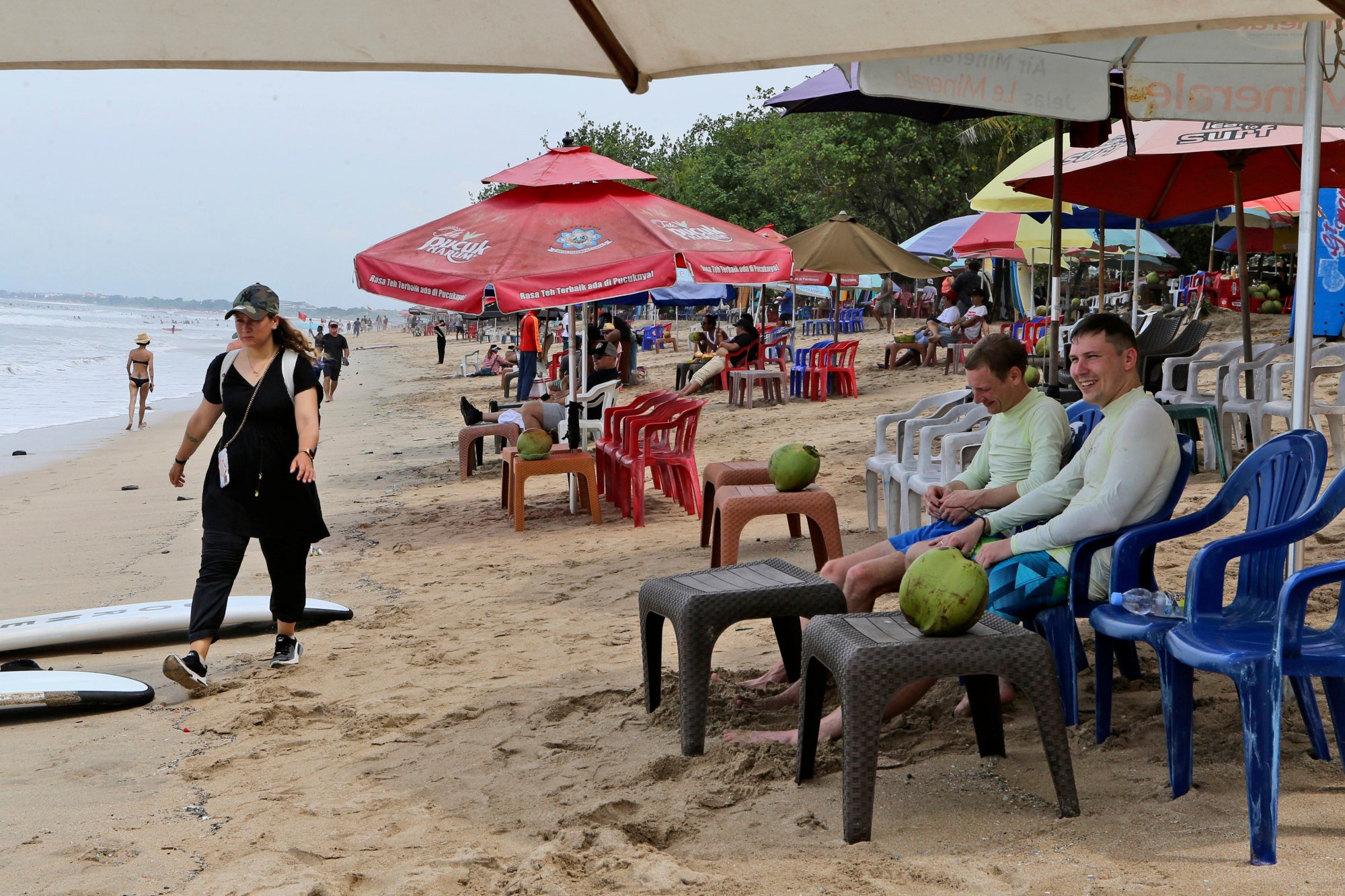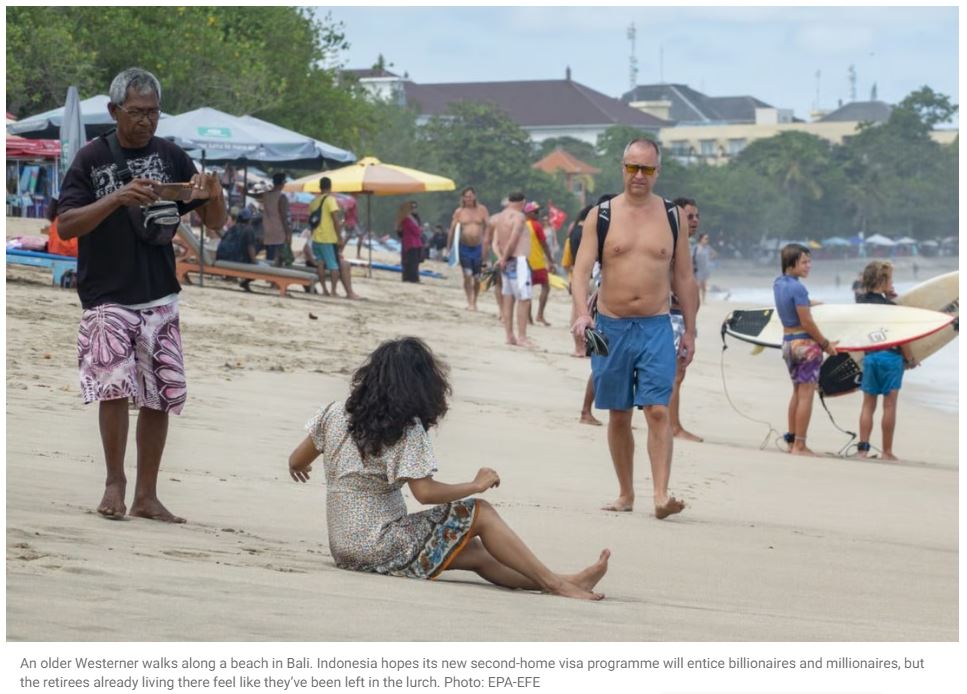Indonesia’s foreign retirees fear being driven out as new visa scheme targets ‘filthy rich’
- Foreigners will be required to have at least US$128,000 worth of cash in Indonesia or proof they own luxury property under the new second-home visa
- It will replace existing retirement visas, leaving long-term foreign retirees who cannot meet the requirements feeling anxious about their futures
Indonesia’s bid to increase international investments with a so-called second-home visa for the wealthy may drive out foreign retirees who have long considered the country their only home.
Under the second-home visa, foreigners can stay in Indonesia for five to 10 years, as long as they have at least 2 billion rupiah (US$128,000) of deposits in their personal accounts at one of Indonesia’s state-owned banks, or proof they own luxury property.
The government hopes the programme will entice billionaires and millionaires, foreign investors, Indonesians abroad, highly skilled workers and wealthy elderly foreign tourists to the country.
“This immigration policy is one of the non-fiscal incentives that can be a stimulus for certain foreigners to stay and contribute positively to the Indonesian economy amid increasingly dynamic global economic conditions,” said Widodo Ekatjahjana, acting director general of Indonesia’s immigration agency at the launch of the visa on October 25.
The new scheme will replace current retirement visa schemes when it is launched on December 24, sparking worry among long-term foreign retirees who permanently live in Indonesia and cannot afford the new thresholds.
At present, elderly foreigners in Indonesia hold two types of permits to stay – a temporary one called Kitas that has a one-year validity and a “permanent” one called Kitap that is valid for five years.

Once the new second-home visa kicks in, holders of both the Kitas and Kitap visas with more than six months of validity will have to convert them to comply with the new scheme or they will lapse, according to a Jakarta Post report that cited a circular issued by the government in October and seen by This Week in Asia.
The circular did not define the value of luxury property, and prices vary across Indonesia. Online expat forums showed that luxury properties are valued at between 3 billion rupiah (US$192,000) in Bali and Yogyakarta and 10 billion rupiah in Jakarta.
Public relations subcoordinator Achmad Nur Saleh from the immigration department told This Week in Asia that details of the second-home visa “will be explained on December 21”.
“We are still adjusting the rules, there will be some changes,” he said on Thursday.
‘Are they that cold-hearted?’
The uncertainty has left some foreign retirees and pensioners pondering their next move, particularly those who cannot afford to meet the new requirements.
Among them is Australian pensioner James, who spoke to This Week in Asia on the condition that he used a pseudonym.
The 80-year-old first travelled to the resort island of Bali in 1968, making back-and-forth visits before deciding to settle down in 1996, when he retired.
“You get off that aeroplane and you just know you’re somewhere you want to be,” James said. Bali at the time was “a really exotic place that not many people knew about”.
James said he first relied on tourist visas, travelling to Singapore every six weeks before returning to Bali on the same day. He later switched to a sociocultural visa that allowed him to stay for six months. In 2010, he converted that to a retirement visa, which is renewed yearly.
“At that point I decided that I would definitely stay here. I took a lease of land for 25 years in Sanur [in southern Bali], and built a house that costs about 3 billion rupiah [at the time],” the former entrepreneur said.
Having just renewed his retirement visa in early December, James said his future in Indonesia was uncertain and that he could now only wait for more information from the immigration agency.
“Under this new law, as I’ve been told by the agent, the interpretation is that you’ve got six months after [December 24] to convert to the new visa. Well I can’t do that, because the 2 billion that I would need to invest, I’ve already invested,” he said.
“Are they that cold-hearted that they wouldn’t have thought about the people that were being told that they had six months to convert, or do they just believe that Western people have all the money?” he questioned. “That’s what Indonesians used to think, that we’re all filthy rich.”
Holders of current retirement visas only need to prove they have a sustainable income of at least US$1,500 per month, typically shown with a pension fund statement, as well as proof of accommodation in Indonesia such as a long-term rental agreement or a title deed to a residential property.
“I couldn’t afford to go back to Australia; what do I do with my house here and my possessions?
“I have three kids there … but you can’t crash in on them at this stage. One does not like to burden one’s children with one’s problems,” he added.
Elizabeth, another pensioner from Australia who has lived in Bali for more than 20 years, shared the same sentiment.
“Many of us have been here for 10, 20, 30 years, or more. We have invested in long land leases and built or leased houses with the expectation that we would live out our lives here,” said Elizabeth, who also used a pseudonym.
“We can’t afford to return to our home countries and most do not have the required 2 billion rupiah to park in a bank here,” she said. “I think in the quest to attract wealthy retirees to Bali, the government has not considered the thousands of modest retirees who already live here.”
Talk about second-home visas has also heated up among expats online, including in a Facebook group that discusses law and regulations in Indonesia.
One member of the group wrote: “If push comes to shove, I will go to Cambodia. I’m 73 and couldn’t go back to England, [it’s] too stressful. Cambodia is retirement-friendly, and the cost of living is much lower than Bali.”
According to Australian James, many of his fellow foreign retirees also question whether there would be a regulation that guarantees their benefactors can withdraw the retirees’ money from their Indonesian bank accounts when they die.
“There’s not really a good, strict regulation to guarantee anyone would get that money back. That’s what a lot of people are worried about,” he said.
Retirement visa-holders can for now only hope that Jakarta will offer a “grandfather clause” to their visas, or a clause that exempts them from the requirements put in place under a second-home visa.
“What can I do at this stage? I must say that [the uncertainty] just does not go away,” James said. “It’s a bit like getting a medical diagnosis, it’s not too good.”
Source: https://www.scmp.com/week-asia/people/article/3203552/indonesias-foreign-retirees-fear-being-driven-out-new-visa-scheme-targets-filthy-rich?module=perpetual_scroll_0&pgtype=article&campaign=3203552


 Thailand
Thailand




